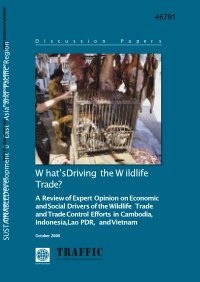What’s Driving the Wildlife Trade? A Review of Expert Opinion on Economic and Social Drivers of the Wildlife Trade and Trade Control Efforts in Cambodia, Indonesia, Lao PDR, and Vietnam
By TRAFFIC
The trade in wildlife living in the forests and other natural habitats in East and Southeast Asia is of great importance and concern. While we continue to prepare and implement many conservation-related projects across the region, we are aware that unsustainable wildlife trade, much of it illegal, undermines the best attempts by governments and NGOs to secure viable populations of many species. The abundance of many wild species in the forests and other ecosystems is now just a shadow of what it was - and could be - to the detriment of those who have relied on those species in a sustainable manner for livelihoods, including in times of food insecurity. In 2005, we launched the report Going, Going, Gone? The Illegal Trade in Wildlife in East and Southeast Asia, which described the nature and scale of the trade, including through case studies. It described the markets, including illegal markets, for wildlife. However, in our discussions on how to move forward in tackling the problems identified in the report, we became aware that there was limited understanding of the economic and social drivers of these markets. This information is needed to determine the actions most likely to succeed given the wide range of market contexts within which the illegal wildlife trade operates in the region. This report is intended to help address this information gap. It was supported financially by the World Bank-Netherlands Partnership Program and prepared by TRAFFIC, in collaboration with staff from the IUCN Asia Ecosystems and Livelihoods Group and Species Programme and The World Bank. We believe this to be an important contribution to the effort to generate information about the economic and social factors influencing illegal and unsustainable wildlife trade in Southeast Asia. It is our sincere hope that this information will result in more effective policies, programs and projects aimed to address the illegal and unsustainable trade in wildlife in the region.
Cambridge, UK: TRAFFIC: Washington, DC: World Bank, 2008. 120p.


